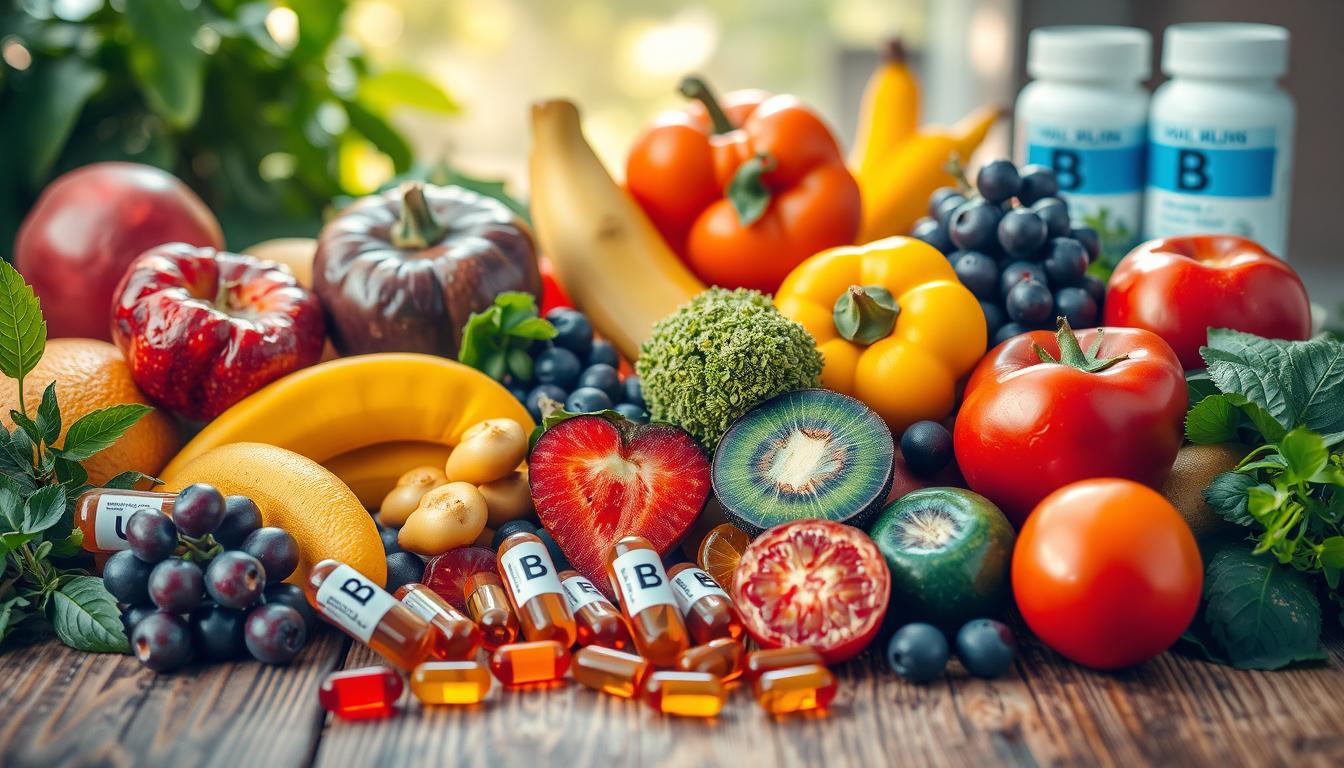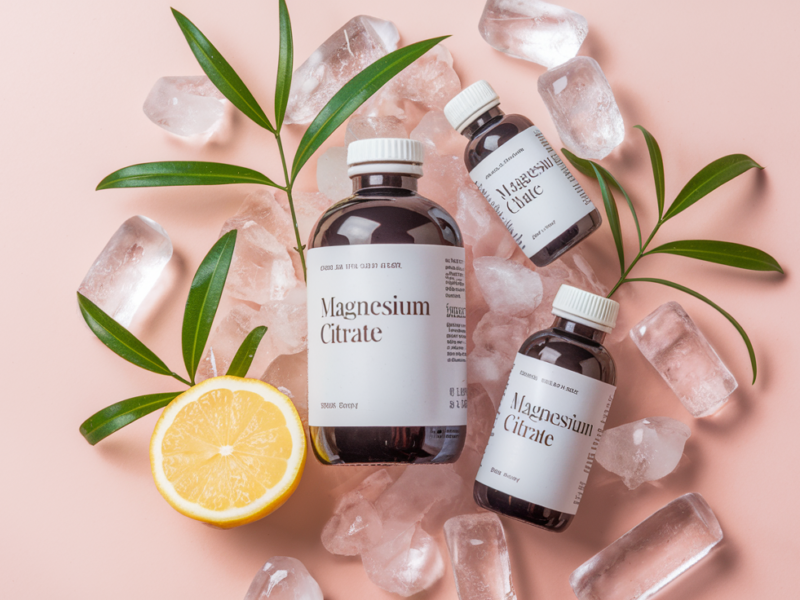Did you know 31% of people in the U.S. might not get enough vitamins? B vitamins are key for health. They help with energy, brain work, and making red blood cells.
B vitamins are eight water-soluble vitamins we need every day. They are thiamine (B1), riboflavin (B2), niacin (B3), pantothenic acid (B5), pyridoxine (B6), biotin (B7), folate (B9), and cobalamin (B12). Each B vitamin does something special in our bodies. Not getting enough can cause health problems.
How much B vitamins we need changes based on our age, gender, and life stage. For example, men need 1.2 mg of thiamine (B1) daily. Pregnant women need 1.4 mg. People who don’t eat meat might need B-complex supplements because they don’t get enough B12 from plants.
It’s important to get enough B vitamins for our health. They help us make energy, work our nerves, and make red blood cells. Knowing how important B vitamins are and adding them to our diet or supplements can help us stay healthy.
Key Takeaways
- B vitamins are essential nutrients that play vital roles in energy production, brain function, and red blood cell formation.
- There are eight B vitamins: thiamine (B1), riboflavin (B2), niacin (B3), pantothenic acid (B5), pyridoxine (B6), biotin (B7), folate (B9), and cobalamin (B12).
- B vitamins are water-soluble and must be replenished daily through diet or supplementation.
- The recommended daily intake (RDI) for B vitamins varies based on age, gender, and life stage.
- Vegans, vegetarians, and individuals with certain medical conditions may be at a higher risk of B vitamin deficiencies.
What is Vitamin B Complex?
Vitamin B complex is a group of eight important vitamins. They are all water-soluble and help your body in many ways. The group includes thiamine (B1), riboflavin (B2), niacin (B3), pantothenic acid (B5), pyridoxine (B6), biotin (B7), folate (B9), and cobalamin (B12).
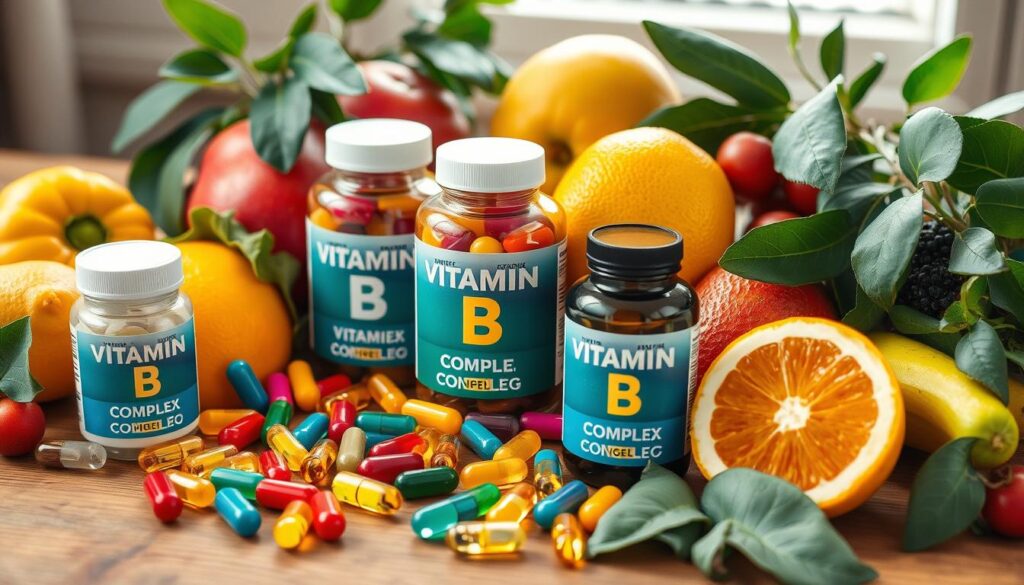
Because they are water-soluble, your body doesn’t keep them for long. So, you need to get them from food or supplements often. Each vitamin in the group does different things to help your body.
The Eight B Vitamins
Here’s a quick overview of the eight b vitamins that make up the vitamin b complex:
- Thiamine (B1): Essential for energy metabolism and nervous system function
- Riboflavin (B2): Supports energy production, cellular growth, and metabolism
- Niacin (B3): Aids in energy metabolism, nervous system function, and digestive health
- Pantothenic acid (B5): Involved in the synthesis of hormones and neurotransmitters
- Pyridoxine (B6): Crucial for protein metabolism, red blood cell formation, and brain development
- Biotin (B7): Supports metabolism, hair, skin, and nail health
- Folate (B9): Essential for DNA synthesis, red blood cell formation, and fetal development
- Cobalamin (B12): Necessary for red blood cell formation, neurological function, and DNA synthesis
Water-Soluble Nature of B Vitamins
The water-soluble nature of b vitamins means they are easily removed from the body. This is why you need to eat them often. But, this also means you can’t get too much of them because your body gets rid of extra quickly.
| B Vitamin | Recommended Dietary Allowance (RDA) |
|---|---|
| Thiamine (B1) | 1.2-1.7 mg/day |
| Riboflavin (B2) | 1.4-2.1 mg/day |
| Niacin (B3) | 14-23 mg/day |
| Pantothenic acid (B5) | 5-7 mg/day |
| Pyridoxine (B6) | 1.3-2.0 mg/day |
| Biotin (B7) | 30-100 mcg/day |
| Folate (B9) | 400-600 mcg/day |
| Cobalamin (B12) | 2.4-2.8 mcg/day |
The Vital Roles of B Vitamins in the Body
B vitamins are key for staying healthy. They help with energy production, metabolism, brain function, nervous system health, and red blood cell formation. Let’s explore how B vitamins help with these important tasks.
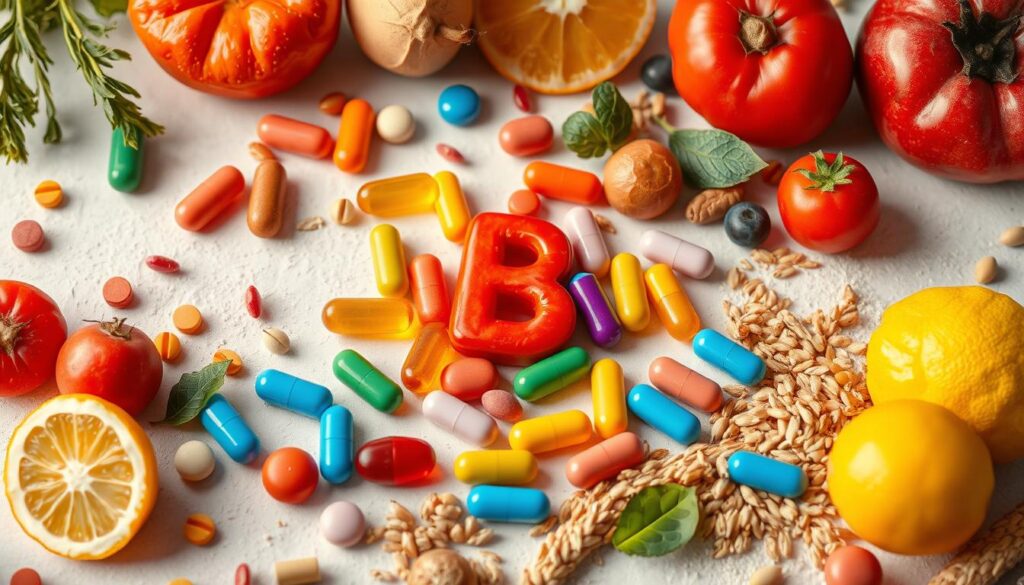
Energy Production and Metabolism
B vitamins turn food into energy for your body. They help break down carbs, fats, and proteins. This releases energy. Thiamine (B1), riboflavin (B2), niacin (B3), pantothenic acid (B5), and biotin (B7) are important for this process.
Brain Function and Nervous System Health
B vitamins keep your brain and nervous system healthy. They help make neurotransmitters, which let nerve cells talk to each other. Vitamin B6, B9 (folate), and B12 are key for brain health.
They help with mood, thinking, and memory. Not having enough can cause problems like depression and dementia.
Approximately 50% of the eight B-vitamins (B1, B2, B3, B5, B6, B7, B9, B12) are essential for brain function, including energy production, DNA/RNA synthesis/repair, methylation, and neurochemical synthesis.
Red Blood Cell Formation
B vitamins, like B9 (folate) and B12, help make red blood cells. These cells carry oxygen to your body’s tissues and organs. Without enough folate or B12, you might get anemia.
The amount of B vitamins you need changes with age and gender. For example, men need 1,300µg of Vitamin B2 (riboflavin) daily. Pregnant women and kids need more too.
Benefits of B Complex for Specific Health Conditions
B complex vitamins are good for many health issues. They help a lot with heart health and when you’re pregnant.
Cardiovascular Health
B vitamins like folate (B9), B6, and B12 are key for a healthy heart. They keep homocysteine levels right. Too much homocysteine can lead to heart disease and stroke.
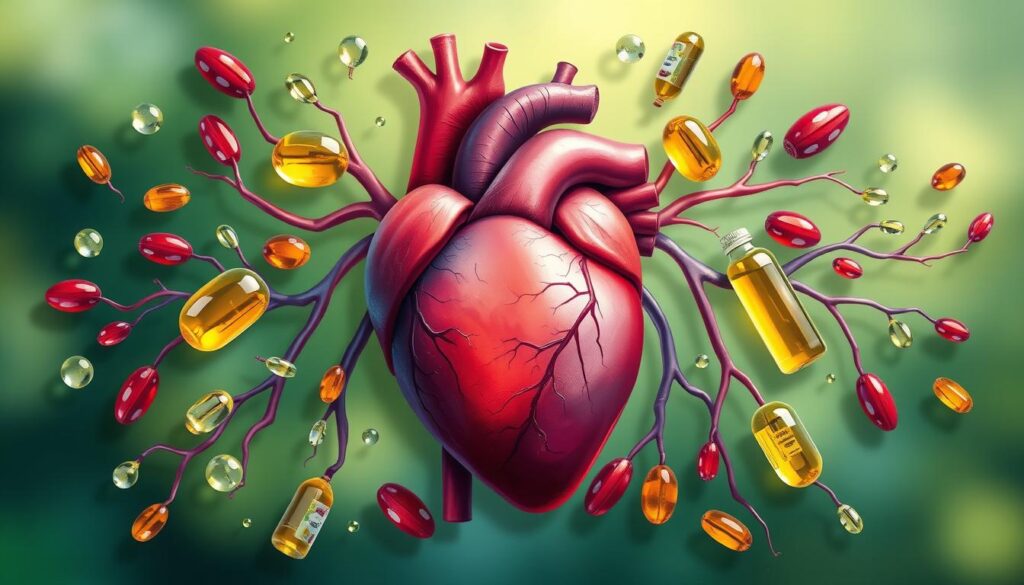
Research shows B vitamins can lower heart disease risk. They might help more if you have certain genes that affect how you use these vitamins.
Pregnancy and Fetal Development
B vitamins are very important when you’re pregnant. Folic acid (B9) is key to prevent brain and spine birth defects. The CDC says all women should take 400 mcg of folic acid every day.
B6 and B12 are also important for the baby’s growth. They help with the nervous system, red blood cells, and overall growth. Taking enough of these vitamins can make pregnancy healthier and lower risks.
Pregnant women should talk to their doctor about B vitamins. They might need more than others. Prenatal vitamins have the right mix of B vitamins for mom and baby.
Importance of B Complex for Vegans and Vegetarians
If you eat a plant-based diet, like vegan or vegetarian, watch your B vitamins. A good plant-based diet gives most nutrients. But, some B vitamins, like B12, are mainly in animal foods.
Vitamin B12 helps make red blood cells and keeps nerves working right. Vegans and vegetarians might not get enough B12. This can lead to a B12 deficiency. Signs include:
- Anemia
- Fatigue
- Weakness
- Constipation
- Neurological issues like confusion and poor memory
To get enough B12, vegans and vegetarians should eat fortified foods or take supplements. Fortified milks, nutritional yeast, and some cereals are good sources.
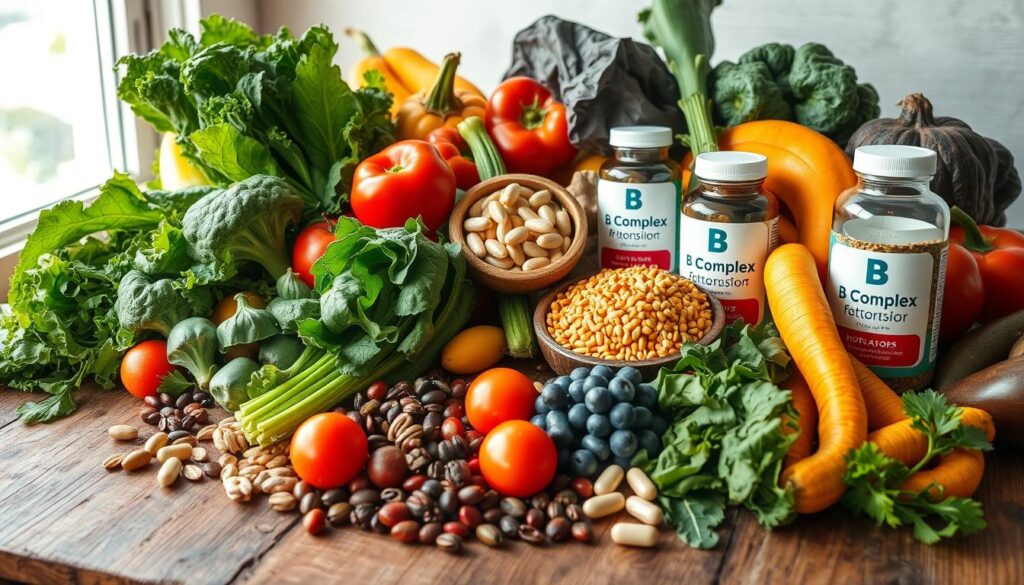
Other B vitamins are also important for vegans and vegetarians. For example, folate (B9) might not be absorbed well by some drugs. Eating foods rich in folate, like leafy greens and legumes, is key for health.
| Vitamin | Vegan Sources | Vegetarian Sources |
|---|---|---|
| B12 (Cobalamin) | Fortified plant-based milks, nutritional yeast, supplements | Eggs, dairy products, fortified foods, supplements |
| B9 (Folate) | Leafy greens, legumes, fortified grains | Leafy greens, legumes, fortified grains, eggs |
| B2 (Riboflavin) | Almonds, mushrooms, fortified grains | Almonds, mushrooms, fortified grains, dairy products |
“A balanced, plant-based diet can provide most of the nutrients needed for optimal health, but it’s important to be mindful of possible nutrient gaps, specially with B vitamins.”
Eating a variety of B vitamin-rich plant foods is key. Also, think about fortified foods or supplements if needed. Talking to a healthcare provider or dietitian can help make sure your diet is right.
Signs and Symptoms of B Vitamin Deficiencies
B vitamin deficiencies can show up in many ways. They can affect different parts of your body. In the US, severe deficiencies are rare thanks to food fortification. It’s key to know the signs and symptoms to fix any problems fast.
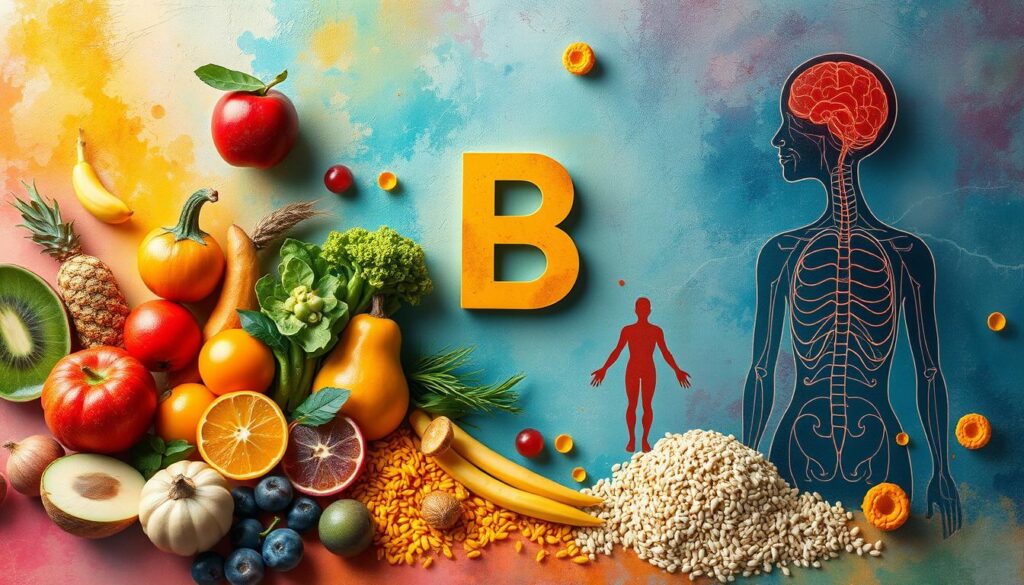
Thiamine (B1) Deficiency
Thiamine deficiency is rare in the US. But, it can cause tiredness, weakness, and brain problems. A bad case can lead to beriberi, harming your heart and brain.
Riboflavin (B2) Deficiency
Riboflavin deficiency is rare in the US. But, some groups like vegans and pregnant women might face a higher risk. Signs include skin and mouth issues, and anemia.
Niacin (B3) Deficiency
Niacin deficiency is rare in the US. It can cause stomach problems, skin issues, and brain symptoms. A severe case can lead to pellagra, harming your skin and causing dementia.
Vitamin B12 Deficiency
Vitamin B12 deficiency can cause many symptoms. These include:
- Anemia
- Tiredness and weakness
- Pale skin
- Heart palpitations
- Loss of appetite and weight loss
- Neurological damage and cognitive decline
Being at risk for vitamin B12 deficiency includes:
- Autoimmune gastritis
- Gastrectomy
- Small bowel resection
- Bariatric surgery
- Vegan diet
- Intestinal disorders affecting absorption
- Certain medications like metformin
To avoid b vitamin deficiencies, eat a balanced diet. Include lean proteins, whole grains, fruits, and veggies. If you think you have a deficiency, see your doctor for help.
Food Sources Rich in B Vitamins
B vitamins are key for good health. You can find them in many foods. Eating a mix of animal and plant foods, plus fortified ones, helps you get enough.
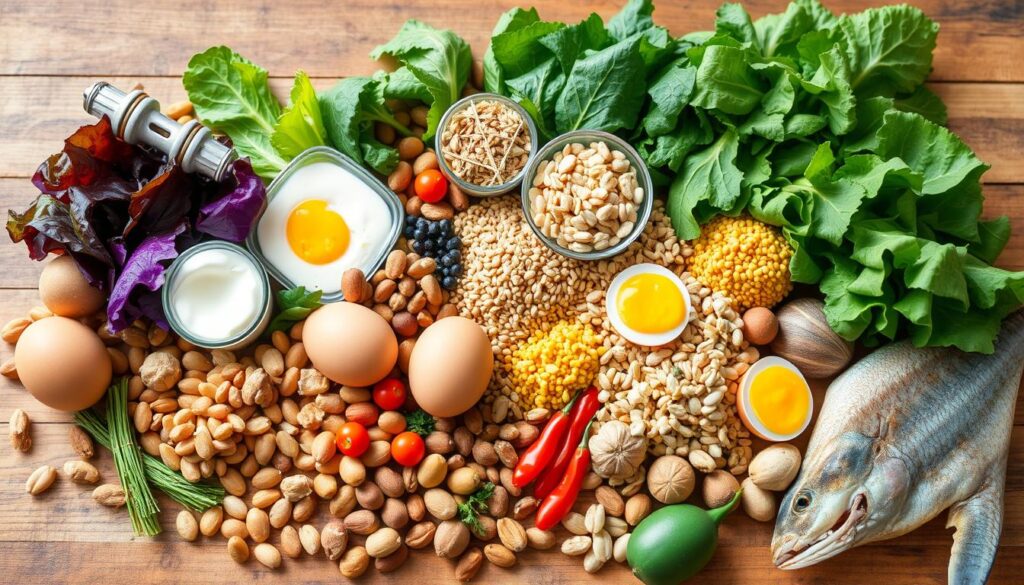
Animal-Based Sources
Animal foods are packed with B vitamins. Here are some top picks:
- Salmon: A 3.5-oz serving has 23% DV of thiamine (B1), 37% DV of riboflavin (B2), 63% DV of niacin (B3), 38% DV of pantothenic acid (B5), 56% DV of pyridoxine (B6), and 127% DV of cobalamin (B12).
- Beef liver: It gives 15% DV of thiamine (B1), 263% DV of riboflavin (B2), 109% DV of niacin (B3), 139% DV of pantothenic acid (B5), 61% DV of pyridoxine (B6), 139% DV of biotin (B7), 63% DV of folate (B9), and 2,917% DV of cobalamin (B12).
- Shellfish: Oysters have 1,200% DV of cobalamin (B12), clams offer 4,121% DV, and blue mussels give 1,000% DV per 3.5-oz serving.
- Chicken and turkey breast: A 3.5-oz serving of cooked chicken breast has 86% DV of niacin (B3), 35% DV of pyridoxine (B6), and 14% DV of cobalamin (B12). Turkey breast provides 74% DV of niacin (B3), 47% DV of pyridoxine (B6), and 16% DV of cobalamin (B12).
- Eggs: Two large eggs have 46% of the daily value of vitamin B12 and 39% of the daily value of vitamin B2.
- Dairy products: Yogurt gives 18% DV of riboflavin (B2) and 26% DV of cobalamin (B12) per 2/3-cup serving.
Plant-Based Sources
Plant foods also have B vitamins, even if they’re not as high as animal foods. Here are some good ones:
- Legumes: Edamame has 60% DV of folate (B9) per 1/2-cup cooked serving.
- Citrus fruits: Oranges, clementines, and lemons have at least six of the eight B vitamins.
- Avocados: A cup of avocados (150 grams) has 30% of the daily folate requirement and 23% of vitamin B6.
Fortified Foods
Many foods are fortified with B vitamins. This helps people meet their daily needs. Fortified breakfast cereals, for example, often have thiamin, riboflavin, vitamin B6, folate, and B12.
| B Vitamin | Recommended Daily Intake (Adults) |
|---|---|
| Thiamin (B1) | 1mg for men, 0.8mg for women |
| Riboflavin (B2) | 1.3mg for men, 1.1mg for women |
| Niacin (B3) | 16.5mg for men, 13.2mg for women |
| Pantothenic Acid (B5) | No set amount due to presence in various foods |
| Pyridoxine (B6) | 1.4mg for men, 1.2mg for women (aged 19-64) |
| Biotin (B7) | 0.9mg or less per day in supplements |
| Folate (B9) | 200 micrograms |
| Cobalamin (B12) | 2.4 micrograms |
Supplementing with B Complex
Eating a balanced diet is the best way to get B vitamins. But, some people might need b complex supplements. These supplements have all eight B vitamins in one pill or capsule. This makes it easy to get enough of each vitamin.
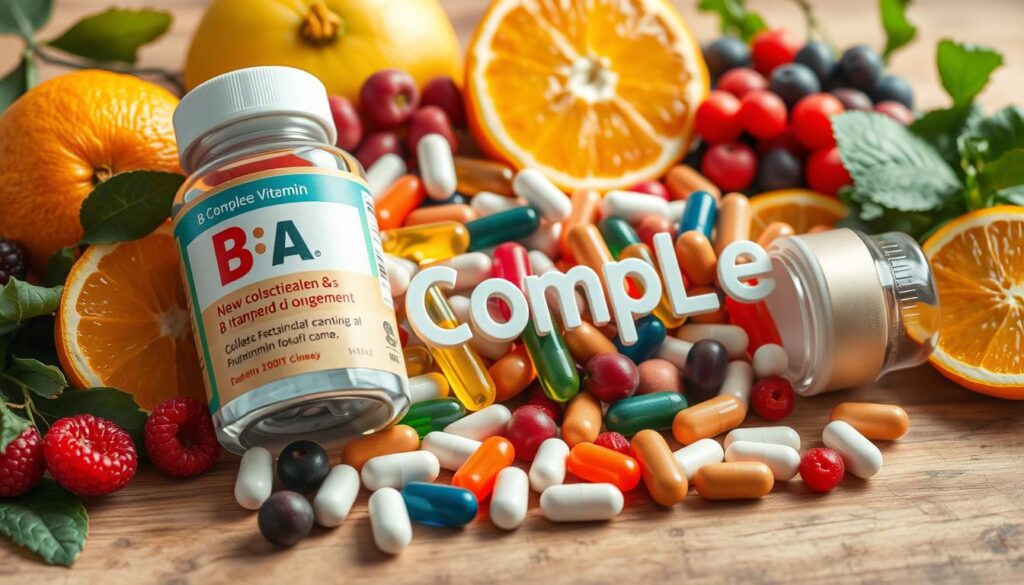
Who May Benefit from B Complex Supplements?
Some groups might need more B vitamins. These include:
- Vegans and vegetarians, who may not get enough B12 from their diet
- Older adults, who may have trouble absorbing B vitamins from food
- People with certain health conditions that affect nutrient absorption, such as celiac disease or inflammatory bowel disease
- Pregnant women, who need more folic acid for the baby
Choosing the Right B Complex Supplement
Choosing a good B complex supplement is key. Look for products that have been tested for quality. Also, talk to your doctor about the right amount for you.
Here are some popular B complex supplements and their ratings:
| Supplement | Number of Reviews | Average Rating (out of 5) |
|---|---|---|
| Super B-Complex With C | 41 | 4.51 |
| Super B Energy Complex | 98 | 4.46 |
| Stress B-Complex With C & Zinc | 30 | 4.57 |
| B-Complex With C | 54 | 4.85 |
| B-100 Complex Time Release | 12 | 4.67 |
Supplements can help, but they shouldn’t replace a healthy diet. Always try to get your nutrients from food first. Use supplements only when needed.
Potential Risks and Side Effects of Excessive B Vitamin Intake
B vitamins are good for us, but too much can be bad. Knowing how much to take is key. Check out this link for more info.
In 2012, there were 59,028 cases of vitamin overdose. Only one person died. But, some B vitamins like niacin and B6 caused more problems. In 2015, niacin and B6 led to 1,374 and 189 cases, respectively.

Some B vitamins are safe up to a certain amount. Biotin, for example, is safe and doesn’t have a limit. But, too much folic acid can hide vitamin B12 problems in older people.
Too much of some B vitamins can cause issues. Here’s a list:
| B Vitamin | Potential Side Effects of Excessive Intake |
|---|---|
| Niacin (B3) | Skin flushing, itching, nausea, liver damage |
| Pyridoxine (B6) | Nerve damage, skin lesions, sensitivity to light |
| Folic Acid (B9) | Masking vitamin B12 deficiency, increased risk of certain cancers |
| Vitamin B12 | Headache, nausea, vomiting, diarrhea, fatigue, tingling sensation in hands and feet |
Vitamin B12 supplements are usually safe. But, they can interact with some medicines. Always talk to a doctor first.
See a doctor before taking B vitamins. They can guide you on the right amount. This way, you avoid any bad effects.
Conclusion
B complex vitamins are key for your health. They help your body work well. You get these vitamins from food or supplements.
These vitamins help with energy, brain work, and more. They make red blood cells and boost your immune system. Eating foods like whole grains and nuts helps you get enough.
Watch for signs of vitamin B lack, like tiredness and muscle cramps. If you think you’re missing out, talk to a doctor. They can help you with supplements if needed.
